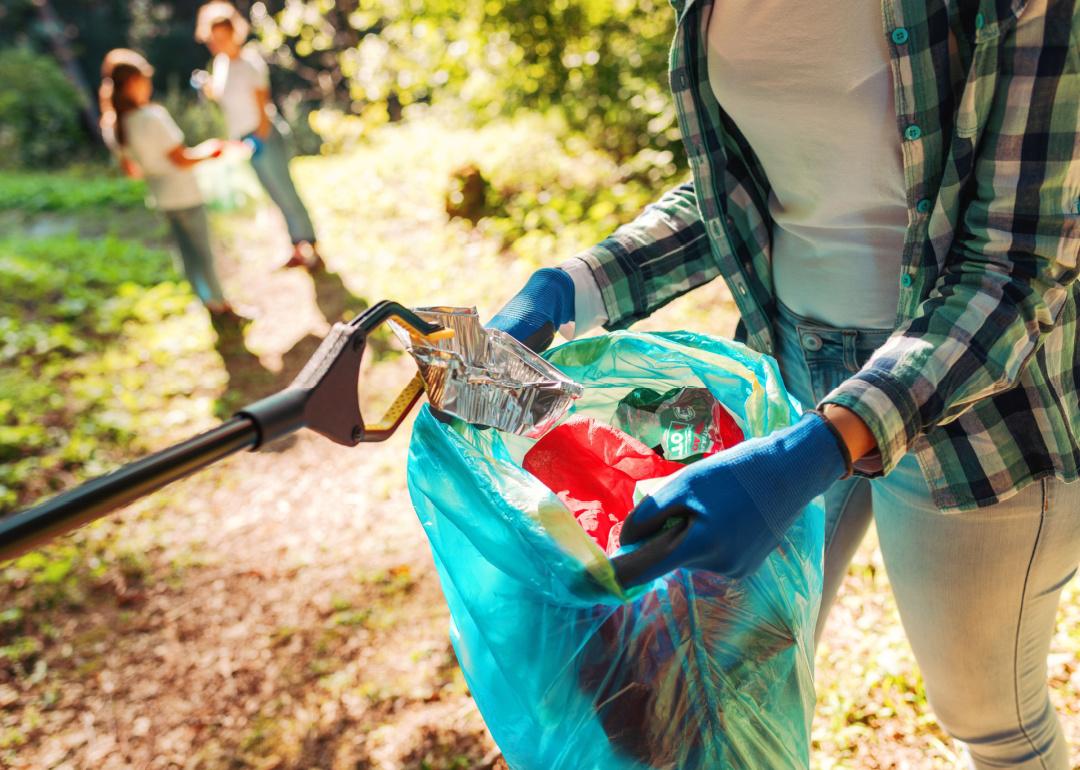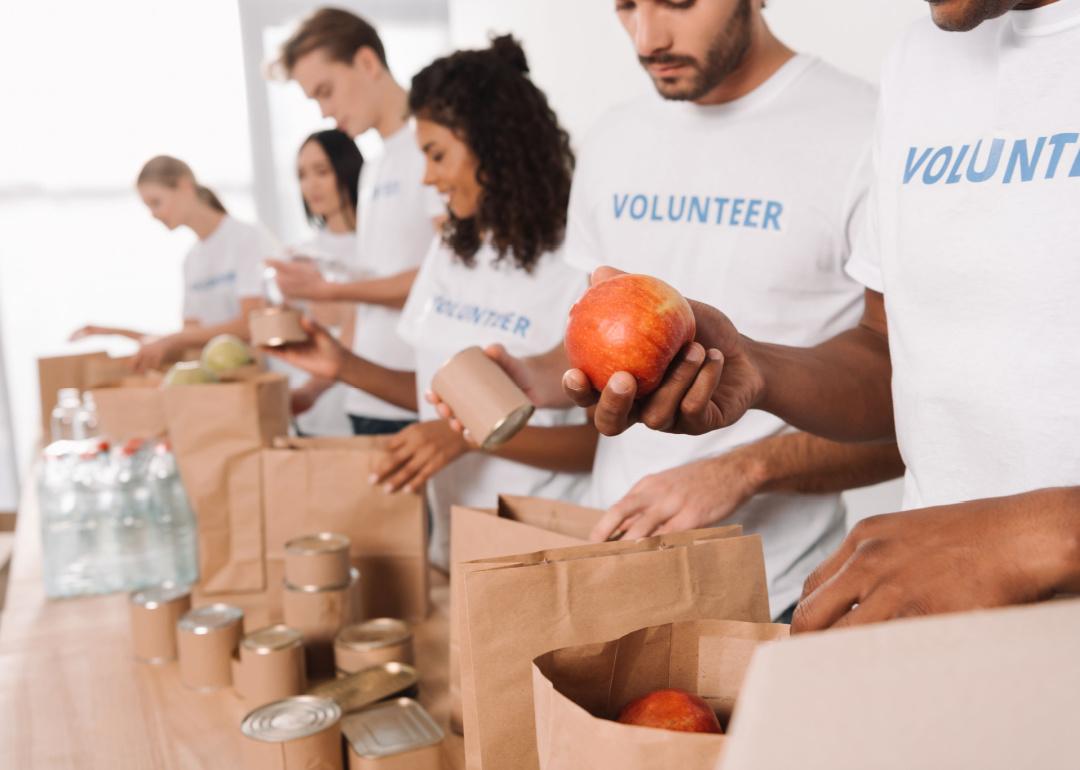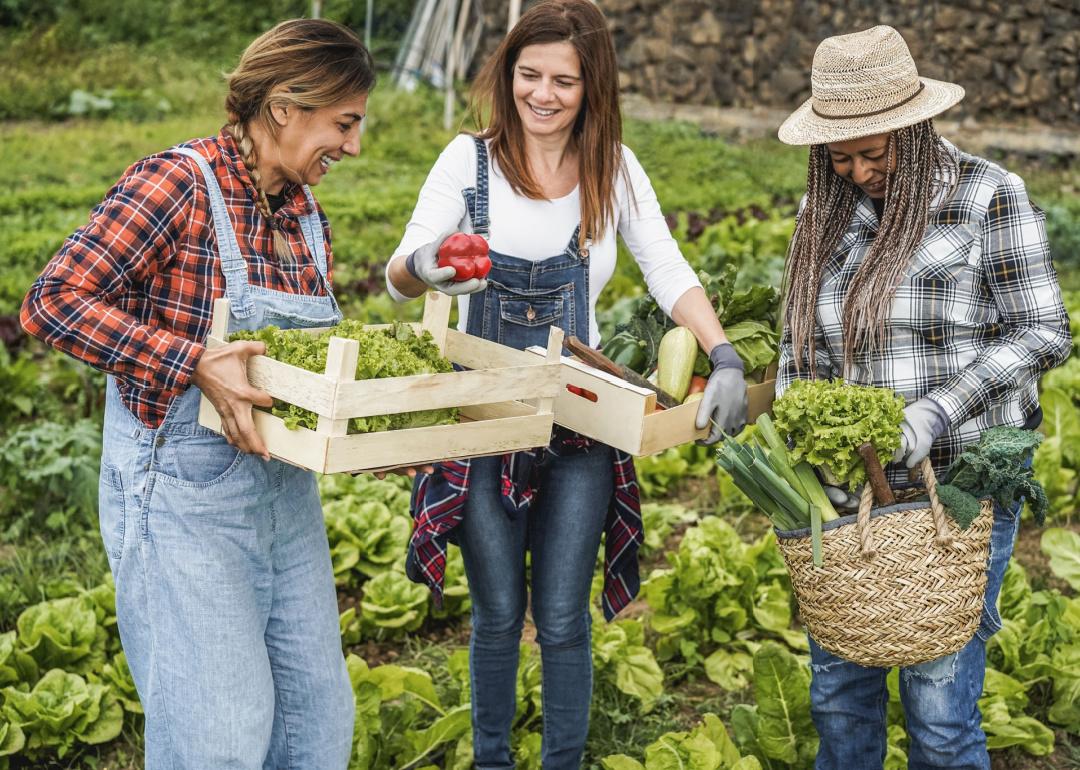10 community service projects to do as a team

Ground Picture // Shutterstock
10 community service projects to do as a team
Volunteer with clipboard organizing donations.
When coworkers come together to participate in community service projects, it doesn’t only engage employees with social good and help to revitalize neighborhoods; doing community service with colleagues has also been shown to increase employees’ commitment to their places of work and help with retention and recruitment.
Whether you work with a small group or within a large department, there are countless opportunities to get involved with a common cause. According to Americorp’s most recent data from 2019, 77.9 million Americans (or roughly 30% of the population) volunteered through or for an organization or association that year. But there are plenty of ways to contribute to community-based initiatives on your own as well.
To help determine how to get started, Pyn compiled a list of 10 ideas for community service projects that companies, organizations, and other groups can do together to bond while helping to give back to their communities.
Keep reading to discover 10 community service projects you can do as a team while bolstering company culture.
![]()

Dragana Gordic // Shutterstock
Donation drive
Volunteers organizing donations.
Particularly around the holidays, donation drives can help many people in need. If you want to start a community drive from scratch, partnering with a local or national organization like Toys for Tots may be easier, which supports children and families. National organizations can also be a great option for remote employees who may be living in different areas of the country.
You can also connect with local business owners to spread the word and potentially sponsor donation drives. Using social media and free fundraising tools can grow your project, and many toolkits are available to help get your group started.

Ground Picture // Shutterstock
Tree planting and pruning
Volunteers planting trees in park.
Planting trees helps to beautify communities while removing carbon from the atmosphere, providing cooling shade, aiding in water retention and habitat formation, and helping those living in the community see the immediate benefits of their efforts.
Tree-planting campaigns can be found from coast to coast, so it’s a great team-building activity for remote workers too. To tap into larger organizations for inspiration and a common goal, look to national campaigns such as the Nature Conservancy’s Plant a Billion Trees effort. At a more local level, you may consider partnering with your parks and recreation department to get started planting trees in your community.

wavebreakmedia // Shutterstock
Charity walk
Participants of charity marathon gathered in park.
Charity walks have become a mainstream way for nonprofit organizations to fundraise around specific causes and social issues. Susan G. Komen’s Race for a Cure, which benefits finding a cure for breast cancer, is one popular choice.
It may be helpful to ask colleagues, community members, and groups what causes or social issues they are interested in. Then, you can do some research to determine larger organizations that host charity walks benefiting those causes.
If nothing fits the bill exactly, you can always get creative and start your own charity walk. It can be fun to pick a route and decide which themes to focus on. And remember, charity walks don’t have to be done in one location—people can participate on the same day or set a goal for the same distance from wherever they live.

Ground Picture // Shutterstock
Grocery and meal packaging
Volunteers organizing donations.
At some point in 2021, 10.2% of U.S. households were food insecure, according to the Department of Agriculture. Many organizations, such as Feeding America, are working to end hunger in the U.S.
You and your colleagues could reach out to local pantries to volunteer your time packing meals, or your group could host a food drive themselves. Hosting a food drive activates community members and local businesses to donate to food pantries, building awareness of the community’s needs. Contact local places of worship to spread the word about your food drive.

Stock-Asso // Shutterstock
Trash cleanup
Volunteers cleaning up trash in park.
Neighborhood trash cleanups are popular community service activities often celebrated around Earth Day, but they can be done any time of year. These initiatives can revitalize and beautify neighborhoods while encouraging pride in people’s communities. Green spaces also have myriad mental health benefits, demonstrating the need to protect and maintain these areas.
Always be mindful about checking local rules around potential permits required to clean a public area and regulations around trash dropoff and pick-up, as you never know what you may collect during a community cleanup event.
You can use free tools and resources from Earth Day to get started hosting a community trash cleanup event.

Monkey Business Images // Shutterstock
Career day
Group of students raise hands in classroom.
A career day—where volunteers participate in schools or via Zoom calls to speak about their occupations—can play an important role in your community. It can help young people find inspiration about vocations they didn’t know about and help other folks discover new professional paths.
If you find that a local school doesn’t have a career day planned, you can seize the opportunity to design your own with the help of your coworkers or neighbors. Consider inviting local business owners and leaders in their respective fields to participate and give insights into what they do daily at work.

Monkey Business Images // Shutterstock
Blood drive
Person making a blood donation in hospital.
With someone in the U.S. needing blood or platelets every 2 seconds, according to data from the American Red Cross, hosting a blood drive can be a great way to support people in your neighborhood with immediate, urgent needs.
The Red Cross takes the guesswork out of hosting a successful blood drive, with guidance on everything from what a host must provide to sending reminders to participants. The organization will send phlebotomy facilitators to the event for the actual blood draws, but you can help by keeping records of attendees, managing appointments, setup, and cleanup.

G-Stock Studio // Shutterstock
Stair climb
Group of people running up stairs.
The National First Responders Fund has annual events called stair climbs that support first responders and show solidarity with those who risk their lives each day to protect others.
This exercise-based, community-building initiative encourages participants to bond and set goals. Stair climbing can be done anywhere, with an unlimited number of participants, and in different locations. You can plan stair climbs around monthly or annual themes to extend your activities beyond a one-time event.

LightField Studios // Shutterstock
Care packages
Volunteers organizing food donations.
Care packages have a long history of providing food and other basic necessities to families in need.
There are people in every town who would benefit from care packages and organizations are always looking for local community members to help stock, package, and deliver the goods. Your group of volunteers can seamlessly partner with local food pantries, houses of worship, homeless shelters, and the like to put together care packages for area residents.
You can also reach out to organizations in your area to find out what specific items might be of need. With that information, you can organize your own coalition of people to put together and deliver care packages on your own.

DisobeyArt // Shutterstock
Community garden
People working in garden picking vegetables.
Community gardens yield fresh produce for local residents and donations to area food pantries and soup kitchens. These community spaces welcome volunteers during the growing season, and getting involved is as simple as reaching out on behalf of your group and scheduling a time or times to help.
For a larger, more long-term project, consider starting a community garden on behalf of your company and find coworkers willing to work the gardens during the growing season. These gardens can be started at a shared location, such as a school, fire department, religious center, or on property owned by your place of business.
This story originally appeared on Pyn and was produced and
distributed in partnership with Stacker Studio.
